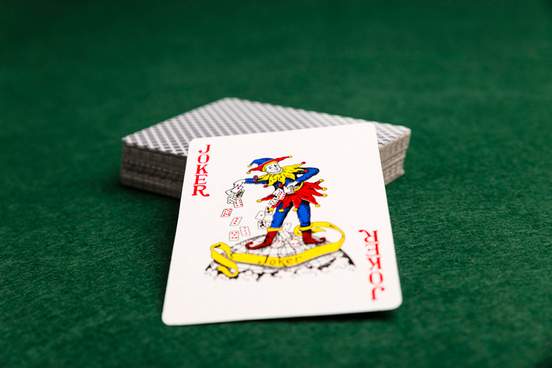
Pompatus
Artist: The Steve Miller Band
Song: “The Joker”
“Some people call me the space cowboy (yeah) / Some call me the gangster of love / Some people call me Maurice / ‘Cause I speak of the pompatus of love.”
Pompatus is not defined in our dictionaries for the reason that just about the only time it appears is in reference to “The Joker.” This makes it a nonce word, which we do define in our unabridged dictionary as “a word coined and used apparently to suit one particular occasion sometimes independently by different writers or speakers but not adopted into use generally.” Steve Miller has attested that he misheard the word from a doo-wop song, which was probably “The Letter” by Vernon Green and the Medallions, first released in 1954. Green’s word was puppetutes, itself a nonce word that he described as meaning something akin to “dream women.” Interestingly, “The Joker” was not the first time Miller used pompatus in a song. The word first appeared a year earlier, in 1972, in the song “Enter Maurice.”
Artist: The Notorious B.I.G.
Song: “Big Poppa”
“So we can steam on the way to the telly, go fill my belly / A T-bone steak, cheese eggs, and Welch’s grape/ Conversate for a few.”
Sorry to those whose feathers are ruffled by the existence of conversate, but the word has been in use in English for over 200 years. While it’s rare to encounter conversate in edited prose—most usage guides discourage its use—it is used regularly in speech and in quotations of such speech as a synonym of converse meaning “to exchange thoughts and opinions in speech.” As lexicographer Jesse Sheidlower once said to author Ta-Nehisi Coates (himself a conversate user and defender) as the two conversated about it for The Atlantic, “People say, ‘We don’t need conversate, we have converse.’ Well then, we don't need hip because we have cool. We don’t need illness because we have malady.’” In the case of Biggie’s 1994 hit “Big Poppa,” it’s easy to see why the late rapper would choose conversate over converse both for rhythmic reasons and to add another long-a sound to match steak and grape.

Catenary
Artist: Joanna Newsom
Song: “Bridges and Balloons”
“The sight of bridges and balloons makes calm canaries irritable / And they caw and claw all afternoon: ‘Catenaries and dirigibles...’”
We could write an entire article about singer-songwriter Joanna Newsom’s idiosyncratic wordsmithery, but highlighting one song will have to suffice. (Indeed, in addition to catenaries and dirigibles, “Bridges and Balloons” also includes the nautical-themed lateen and caravel.) We define catenary as “the curve assumed by a cord of uniform density and cross section that is perfectly flexible but not capable of being stretched and that hangs freely from two fixed points,” and while it’s possible that there’s another song out there that features the word, none immediately spring to mind! Examples of actual catenaries are everywhere, however—from freely hanging overhead power lines to St. Louis’s famed Gateway Arch (technically a “flattened” catenary) to simple suspension bridges, which may be what have the canaries in Newsom’s song so agitated.

Prerogative
Artist: Bobby Brown
Song: “My Prerogative”
“I don’t need permission / Make my own decisions / That’s my prerogative.”
In ancient Rome, voting at legal assemblies was done by group, with the majority in a group determining the vote. The group chosen to vote first on an issue was called the praerogātīva, a word rooted in Latin rogāre, “to ask; to ask an assembly for a decision.” When English adopted prerogative from Latin, via Anglo-French, in the 15th century, it took only the idea of the privilege the ancient Roman voting group enjoyed; the English word referred then, as it also does now, to an exclusive or special right, power, or privilege. Often such a prerogative is tied to an office, official body, or nation, but as Bobby Brown reminded us in his 1988 song “My Prerogative,” the right to live as you like can also be referred to as a prerogative.

Chaise Longue
Artist: Wet Leg
Song: “Chaise Longue”
“Are you coming backstage after the show? / Because I’ve got a chaise longue in my dressing room / And a pack of warm beer that we can consume.”
At the time of this writing, the band Wet Leg recently won two Grammy Awards, one of which was for their debut single “Chaise Longue,” so who knows—maybe this will inspire a whole series or even genre of songs about long, reclining chairs. But also… maybe not. Now, if you’re wondering “Isn’t the word chaise lounge?," feel free to put your feet up, consume some warm beer, and dig into the deets about the history of these two spellings in this handy article.

Brackish
Artist: Vic Chesnutt
Song: “Betty Lonely”
“Betty Lonely lives in a duplex of stucco / On the north bank of a brackish river.”
When the word brackish first appeared in English in the 1500s, it simply meant “salty,” as did its Dutch parent brak. (English speakers also adopted the synonymous brack from the same source but it gets very little use.) Then, as now, brackish was used to describe water that was a mixture of saltwater and freshwater, such as one encounters where a river meets the sea. The late Georgia singer-songwriter Vic Chesnutt, known for both his unconventional word choices and his vivid character sketches, used it on his 1995 album Is the Actor Happy? to set a distinctly Southern coastal scene in a song that also features the lyrics “Betty Lonely just talks to her grandbaby / Everybody else—she blots them out / But her words stick like a flounder gig / Her dry laugh is like a gaff.”

Pogonip
Artist: Gillian Welch
Song: “Wrecking Ball”
“I was just a little Deadhead / A fallen daughter on a scholarship / I got tired and let my average slip / Then I was a farmer in the Pogonip / Where the weed that I recall / Was like a wrecking ball.”
In the mountains of the western United States, the fog condenses into tiny, biting ice particles in extremely cold weather. English-speaking settlers who encountered this phenomenon in the 1800s needed a word for it, and ended up altering the Shoshone word paγɨnappɨh, meaning “cloud,” for this purpose. In Gillian Welch’s song “Wrecking Ball,” the closer from her 2003 album Soul Journey, the singer isn’t reminiscing about farming a certain controversial plant in the freezing fog, but rather in a park in Santa Cruz, California named for it.

Scarper
Artist: Elvis Costello and the Attractions
Song: “Man Out of Time”
“Love is always scarpering or cowering or fawning / You drink yourself insensitive and hate yourself in the morning.”
Now, our friends from across the pond may raise an eyebrow at the inclusion of scarper here, as it’s not exactly uncommon in British English. But we reckon that more than one Yank was moved to crack open the dictionary upon hearing “Man Out of Time,” the second single from the 1992 album Imperial Bedroom by Elvis Costello and the Attractions. Scarper means “to flee or run away” or, more broadly “to leave or depart,” and likely shares etymological roots with escape.

Precocious
Artist: Kim Carnes
Song: “Bette Davis Eyes”
“She’s precocious / And she knows just what it takes to make a pro blush.”
In the mid-1600s, English speakers used precocious especially to describe plants that produced blossoms before their leaves came out. Within decades, however, precocious was also being used to describe humans who developed skills or talents sooner than others typically did. Pop music lovers may recall the lyric "She’s precocious!" from "Bette Davis Eyes," although the song itself was something of a late bloomer: originally released in 1974 by Jackie DeShannon (and cowritten by DeShannon and Donna Weiss), it didn’t become a hit until Kim Carnes’ Grammy Award-winning version was released in 1981.






